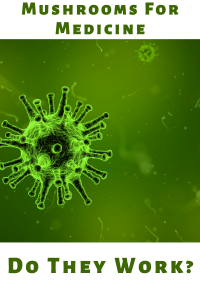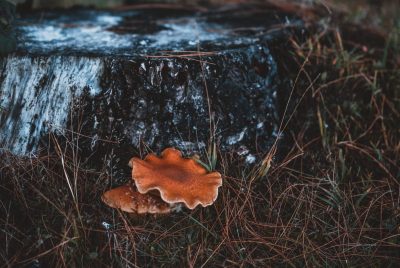The Reishi mushroom, or Ganoderma Lucidum, has been used in Asia for its medicinal value for…
Mushrooms for Medicine: Do They Actually Work?

Traditionally, mushrooms have been used for medicine throughout Asia for hundreds of years. There are nearly 300 species of mushrooms that recent research, whether using mice or animals, has shown evidence of their medicinal benefits.
What about the evidence of mushrooms actually helping humans?
The ability to easily cultivate mushrooms for medicine has improved greatly today. This has led to massive research on the subject over the last couple of decades.
This research has confirmed not only the traditional uses, but it has also opened up a myriad of new possible applications of using mushrooms for medicine as alternative treatments.
Potential Health Benefits of Medicinal Mushrooms
The majority of mushrooms that are edible have incredible levels of antioxidants, beta-glucans, and other notable nutrients within them. They have high fiber and are low in cholesterol, which could be beneficial as a substitute for less healthy foods in our diets.
Uncovering the health benefits of using mushrooms for medicine is best shown by highlighting some of the top medicinal species of fungi.
Like This Article? Pin it on Pinterest

Top 4 Medicinal Mushrooms
Let’s take a look at the top medicinal mushrooms that have the potential to be used for treating certain ailments by using them as a form of medicine.
Shiitake or Lentinula Edodes
Shiitake mushrooms are tan to dark brown, with caps that range between 2 to 4 inches in height, and are native to East Asia. They typically are found to grow naturally on most decaying hardwood trees.
You can find a breakdown of their nutritional value here.
Shiitake mushrooms also have lipids, sterols, terpenoids and polysaccharides that represent their true source of medicinal benefits. These benefits include:
- Lowering cholesterol levels
- Hardening of arteries
- Eczema
- Diabetes
- Immune system boost
- Prostate and breast cancer treatment
- Herpes treatment
- Hepatitis B treatment
Shiitake mushrooms will provide more future evidence for medicine treatments.
Turkey Tail or Coriolus Versicolor
Turkey Tail mushrooms are a multicolored mushroom with a velvety fruiting body, with a width between 2-7 cm and fans out to resemble a turkey’s tail. It is located in the woodlands of Europe and China and along the Pacific Coastal areas of oak woods in the U.S.
You can find a nutrients description for Turkey Tails here.
Turkey Tail mushrooms contain various lipids, proteins, and polysaccharides that offer therapeutic health benefits. A list of these benefits is:
- Cancer
- Post chemotherapy treatment
- Late stage lung cancer
- Prebiotic
- Immune system boost
- Anticarcinogen
- Cirrhosis
- Rheumatoid arthritis
- Leukemia
- Bronchitis
There’s no doubting that Turkey Tails belong in the category of mushrooms for medicine. Further research shall prove its potential value in helping to reshape the way the medical community treats certain ailments.
Reishi or Ganoderma Lucidum
The Reishi mushroom is one of the most visually striking polypore on the planet, with a shiny, hardwood texture. Reishi mushrooms can be found worldwide, and usually grow on trees like oaks and plums and other hardwoods.
Unlike most other mushrooms for medicine, the Reishi has a very long cultivation process. It also grows in 6 different colors, but each have basically the same nutrient, health benefit breakdown.
You can find a complete breakdown of the Reishi mushrooms nutritional value here.
Reishi is classed as an immunomodulator, which allows it to help protect us against some illnesses by optimizing our immune system response and decreasing inflammation. Below is a list of medicinal benefits of the Reishi:
- Liver support
- Meditation aid
- Lower blood pressure
- Allergy treatment
- Fights fatigue
- Anti-aging
- Immune system booster
- Neuro Regenerative
- Antibacterial
While there is a lack of human research studies using Reishi presently, the prospect of evidentiary studies on it shows promise to its ability to be classed as a mushroom for medicine.
Lion’s Mane or Hericium Erinaceus
The Lion’s Mane mushroom is a snow-white, round shaped fungus with hanging tentacle-liked spines. It grows 40-50 cm in diameter and usually grows on dead or decaying broadleaf trees, such as walnut, maple, oak and sycamore.
Lion’s Mane is found in China, Japan, and parts of Europe and North America. Traditionally, this mushroom has been used for medicine due to its high value in treating immune, cognitive, and heart ailments.
This fungus is a delicacy in some parts of the world in edible form, and it’s sold worldwide as a powerful health supplement. Below you’ll find a list of its potential health benefits.
- Fight cancer
- Immune system boost
- Inflammation and Oxidative Stress
- Diabetes
- Digestive tract issues
- Nervous System injuries
- Depression and Anxiety
- Dementia Protection
The beneficial health properties of Lion’s Mane being used as mushrooms for medicine is gaining more interest within the scientific community. Its neurodegenerative potential is probably the most profound medicinal value considering the lack of cognitive treatments existing today.
Conclusion
Using mushrooms for medicine is a technique many cultures have used for centuries. Many recent studies are beginning to confirm not only the traditional uses, but further identification of the beneficial health properties of mushrooms are leading the scientific community toward many alternative treatment applications.
The top 4 mushrooms show how valuable their potential can be to help us maintain a healthy lifestyle. Finding the right mixture that utilizes each of these medicinal mushrooms will be of greater value. Host Defense is probably the best pill form supplement on the market that uses the top 4 mushrooms for medicine.
Time will be a leading factor as empirical evidence continues to build on utilizing mushrooms for medicine. Meanwhile, the prospect of medicinal mushrooms has caused an explosion in local business ventures that are capitalizing on the cultivation of fungi. One way or another, mushrooms will be used as medicine whether the government decides to condone them or not.
Comments (2)
Comments are closed.




[…] there are many methods of sourcing medicinal mushrooms, we are assuming you want to purchase your supplements in the marketplace vs. foraging them for […]
[…] Inonotus obliquus has many medicinal benefits that have been researched using vitro and animal testing. It has been used as an alternative […]